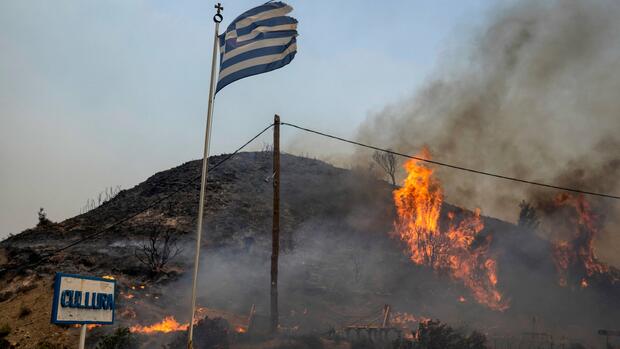Hotels and guesthouses had hoped for a new record in tourist numbers – but then the flames came.
(Photo: dpa)
Athens Day seven of the devastating forest fires on the Greek holiday island of Rhodes: On Monday, the fire brigade fought newly fanned flames in the south-east of the island. As a precaution, around 19,000 tourists have had to leave their holiday apartments and hotels in the endangered areas since the weekend.
Most of the evacuated vacationers spent the second night on bunks and mattresses in sports halls and other emergency shelters. Prime Minister Kyriakos Mitsotakis thanked the fire brigade and civil defense for their commitment in parliament. Thanks to them, no one has been harmed so far. “We are at war,” said Mitsotakis, “The climate crisis is already here.”
Rhodes receives around 2.5 million foreign visitors annually. Brits traditionally make up the largest group of holidaymakers, followed by Germans.
As in Greece in general, a new travel record was expected for this year. In the first half of the year, the number of tourists was already higher than in 2019, the previous record year.
Now the island is concerned that the wildfires will cause a backlash. “At the moment there are hailing cancellations,” reports a hotelier from the holiday resort of Ialysos, although this region in the north-west of the island is not affected by the fire disaster.
Every tenth tourist on Rhodes has to be evacuated
It is said in the industry that 90 percent of hotels and guesthouses are outside the danger zone. Holidaymakers would “practically not notice anything about the fires”. Nevertheless, many guests canceled at the moment.
Around 200,000 tourists are currently staying on Rhodes. One in ten is affected by the evacuations. And most of them just want to get away.
Numerous tourists had to be evacuated on the holiday island.
(Photo: dpa)
According to the tour operator Tui, it currently has around 39,000 guests on Rhodes. Of these, 7,800 were evacuated from their hotels, says Tui spokesman Aage Dünhaupt. Tui and other holiday airlines send planes to the island to fly holidaymakers home early.
The Greek Ministry of Foreign Affairs has set up a helpdesk at Rhodes Airport. Many tourists have left everything behind in the hasty evacuation of the hotels, including their ID cards. How long it will take to fly all vacationers out of the emergency shelters was still unclear on Monday. Unofficially, the Greek Ministry of Tourism said that a far-reaching normalization can be expected by Wednesday.
>> Read here: Can we save the climate with raw materials from the sea?
But that will also depend on how the fire situation develops. On Rhodes, strong winds fanned one of the already contained fire fronts on Monday.
No information on losses from the forest fires
Firefighters also fought several forest fires on the island of Corfu in the Ionian Sea. Around 1,000 tourists were evacuated from the area around the popular holiday resort of Nisaki on Monday night. But they were gradually able to return to their hotels on Monday.
Greek Tourism Minister Olga Kefalogianni appealed to British holidaymakers on the BBC not to cancel their planned holidays to Rhodes and Corfu. Greek authorities and associations do not want to comment on possible economic losses. However, industry experts point out that experience has shown that natural disasters such as forest fires only have a temporary effect on travel behavior.
More serious for the tourism industry in Greece and other Mediterranean countries could be the long-term consequences of the heat waves, which are occurring with increasing frequency and constantly rising temperatures.
According to a study by the United Nations Environment Program (UNEP), the Mediterranean region is warming 20 percent faster than the global average as a result of climate change. With rising temperatures, the risk of forest fires increases. Where there is no more vegetation as a result of the fires, the temperatures rise even more – a vicious circle.
>> Read here: Climate researchers see the economy in danger
According to the Unep study, 30 percent of Greece’s area is at risk of becoming a desert as a result of climate change. Efthymios Lekkas, Professor of Geosciences and Disaster Management at the University of Athens, already sees this process of desertification in the south of the islands of Rhodes and Crete, on Cyclades islands such as Mykonos and in the east of the Peloponnese peninsula.
Lekkas’ particular concern is the capital region of Attica, with its more than four million inhabitants. Year after year, fires decimate the forests around Athens. If this continues, the Attica scientist fears the “collapse of our ecosystem”.
More: How the USA want to save their metropolises from the heat
